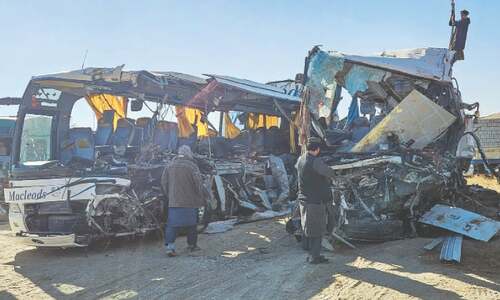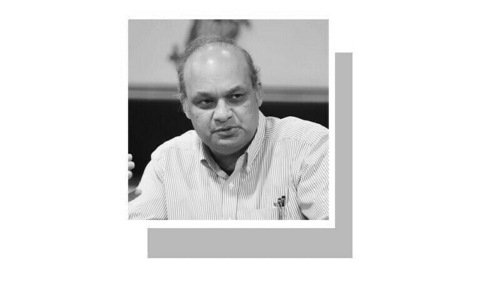
Paradise Lost: A Journey from Kashmir to Karachi
By Syed Nizam Shah
Paramount, Karachi
ISBN: 978-9692101110
280pp.
“I arrived in Pakistan with just 500 rupees in my pocket, and dreams of making it big. I didn’t know a soul here; and I had no home. My roots lay hundreds of miles away, remote and inaccessible. Yet He who is the best of Planners, indeed had better things in store for me,” writes Syed Nizam Shah in his memoir, Paradise Lost: A Journey from Kashmir to Karachi.
As one goes through Shah’s book recounting his eventful life, British writer L.P. Hartley’s quote, “The past is a foreign country, they do things differently there”, from the 1953 novel The Go-Between, comes to mind.
Shah’s journey begins in the idyllic settings of Kashmir. Coming from a respected lineage starting all the way from the Naqshbandi order, he lived a charmed life. His father was the first native Muslim governor of Kashmir during the Dogra administration, and early life revolved around studies, taking care of pets, learning to ride horses — although experience with a wayward and headstrong Shetland pony resulted in a lifelong distaste for riding — and exciting vacations, where the family took luxury trains to stay at the palaces of relatives and friends.
But all would not remain well for long in this earthly paradise, as Partition would tear asunder all the certainties of his comfortable life and young Shah would have to leave for Britain at the age of 13. That acute sense of the loss of his beloved Kashmir, that grief of separation, is why he named his memoirs Paradise Lost.
A memoir traces several displacements, from Kashmir to Britain to Karachi and East Pakistan and offers a rare look in the window curtained by the veil of power
The memoir is written in chronological order and, in that sense, it resembles a bildungsroman. After his sojourn in Britain for academic pursuits — at school, his disappointing cricketing skills went against widely held expectations that every “Indian was born to excel in the game” — he took up employment at the British American Tobacco Company. When his training was complete, Shah came to Pakistan to work for its subsidiary, Pakistan Tobacco Company, in what is now the province of Khyber Pakhtunkhwa.
Fate would later bring him to salubrious Karachi, a city young like him, brimming with ambition and possibility. In his stay, we are offered glimpses of another paradise lost — the Karachi where astronaut Neil Armstrong, American first lady Jackie Kennedy and Great Britain’s Queen Elizabeth would wave at admiring crowds while parading down wide, clean boulevards; a Karachi of cinemas and night clubs, and cabarets where music and libations flowed late into the night.
At this time, Shah moved into an apartment on Drigh Road [Sharae Faisal] and found himself entertaining every evening a struggling artist who sat in the lounge, chain-smoked Shah’s cigarettes and drank half a bottle of alcohol. A costly guest indeed, but then, that was Sadequain.
The curtain would close on that liberally permissive Karachi and, to make the fall from grace complete, the capital would be moved to Islamabad. Another grim episode would follow, as Shah would have to fly to Dhaka — East Pakistan constituted 80 percent of the tobacco company’s profits — in the year 1971.
He flew on a plane with “Army personnel and jawans of the Frontier Corps who had no clue where they were going and for what. They were dressed in grey shalwar kameez and chappals, and had clearly not been briefed that their uniform was not appropriate for the swamps and paddy fields of East Pakistan.” As history morbidly repeated itself, Shah would bear witness to yet another partition, another loss, another yearning, another grief.
But all would not remain well for long in this earthly paradise, as Partition would tear asunder all the certainties of his comfortable life.
At the age of 46, Shah was appointed the youngest ever chairman of Pakistan Tobacco Company. In the later years, the Government of Pakistan would come calling with a series of appointments in state-owned enterprises including the Civil Aviation Authority, the National Development Finance Corporation and the Pakistan Cricket Board among others.
The reader is given a rare look in the window curtained by the veil of power, with all the numerous accounts of the paralysis of policymaking and the inflated egos and political scheming that comes with it. The snap reversals of decisions, lack of vision and ad hoc measures are all reminiscent of the rot that has corroded our institutions. In recounting his memories of the same, the author does not skimp on details.
And, as he traces the historical epochs of his adopted country, Shah would see Pakistan groaning under the influx of Afghan refugees, drugs and ammunition, as their own country imploded. Add to that predatory international consultants and institutions wanting to bleed the country dry under the guise of ‘financial assistance’.
Despite these awful revelations, though, there is also something pleasant to enjoy when the author gets to reunite with Kashmir, if only for a brief moment in time. A transient reclamation of a paradise lost.
The book is part biography, part history and part travelogue told in lucid detail of not just the extraordinary story of one man, but also the extraordinary story of his country.
The reviewer has worked as a producer in news media and analyst in the NGO sector and is a faculty member at the media sciences department at SZABIST
Published in Dawn, Books & Authors, December 26th, 2021













































Dear visitor, the comments section is undergoing an overhaul and will return soon.